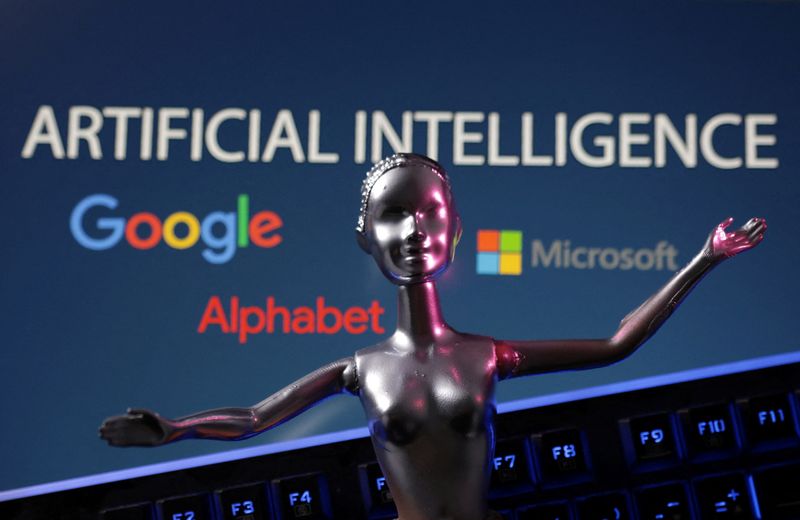By Sheila Dang
(Reuters) - Investors appear to be losing patience with Big Tech's prodigious artificial intelligence investments this week after Meta Platforms (NASDAQ:META) signaled deeper spending and a long road to profitability.
The concession from Meta in its quarterly report late on Wednesday cast a cloud over Microsoft (NASDAQ:MSFT) and Alphabet (NASDAQ:GOOGL), which will both report quarterly earnings on Thursday.
Meta's stock sank 15% in extended trade after it forecast higher AI spending next year, while Microsoft was down 2%, Alphabet fell 3% and Nvidia (NASDAQ:NVDA) dropped 1.4% in reaction.
Wall Street's heavyweight tech-related companies have been locked in a fierce battle to advance generative AI, which can create text, videos and photos from prompts and is seen as the next frontier in tech.
During Meta's earnings conference call, analysts peppered CEO Mark Zuckerberg with questions about how the company was pacing its AI investments. One analyst asked whether Meta was spending more because it saw an even bigger opportunity from AI.
"I think we've gotten more ambitious and optimistic on AI," Zuckerberg responded, pointing to Meta's recent launches of new AI models. "So all of that basically encourages me to make sure that we're investing to stay at the leading edge of this."
Alphabet and Microsoft both said earlier this year when they reported fourth-quarter results that they expected rising AI costs. The investor reaction on Wednesday indicated deepening concerns.
In a research note on Monday about Alphabet, analysts from New Street Research said the potential for materially higher capital expenditures was a worry ahead of results on Thursday.
The research firm said it now expects Alphabet's full-year capital expenditures to be $45.9 billion, up from its previous estimate of $42.7 billion.
Google has been working to catch up in the generative AI race and released Gemini, a model that can understand and create different types of information including text, audio and video.
Creating content with generative AI is energy-intensive, and Zuckerberg cited the cost as a reason for Meta's higher expenses.
Meanwhile, Microsoft has positioned itself to be a winner in AI due to its partnership with OpenAI, which kicked off the generative AI craze last year with ChatGPT, said analysts from Jefferies in a note on March 31.
Microsoft has integrated chatbots into its suite of Office products and is planning to invest more in data centers.

Industry-wide, shareholders are now focused on looking for revenue, including pricing models and whether customers can find use cases that justify the cost of generative AI, Jefferies wrote.
"Last year was spent dreaming of gen AI's potential," the analysts wrote. "This year will be about moving forward with concrete steps."